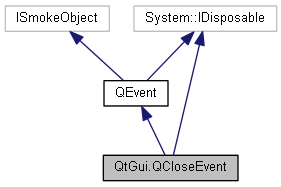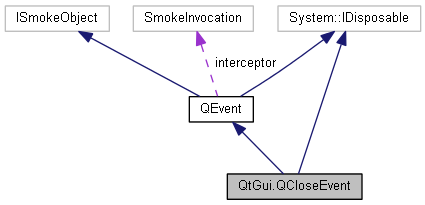|
Qyoto
4.0.5
Qyoto is a C# language binding for Qt
|
|
Qyoto
4.0.5
Qyoto is a C# language binding for Qt
|
The QCloseEvent class contains parameters that describe a close event. More...


Public Member Functions | |
| QCloseEvent () | |
| | |
| QCloseEvent (QCloseEvent copy) | |
| | |
| override void | CreateProxy () |
| new void | Dispose () |
 Public Member Functions inherited from QtCore.QEvent Public Member Functions inherited from QtCore.QEvent | |
| QEvent (QEvent copy) | |
| | |
| QEvent (QEvent.Type type) | |
| | |
| new void | Accept () |
| | |
| new void | Ignore () |
| | |
| new bool | IsAccepted () |
| new void | SetAccepted (bool accepted) |
| new bool | Spontaneous () |
| | |
| new QEvent.Type | type () |
| | |
| new void | Dispose () |
Protected Member Functions | |
| QCloseEvent (System.Type dummy) | |
 Protected Member Functions inherited from QtCore.QEvent Protected Member Functions inherited from QtCore.QEvent | |
| QEvent (System.Type dummy) | |
The QCloseEvent class contains parameters that describe a close event.
Close events are sent to widgets that the user wants to close, usually by choosing "Close" from the window menu, or by clicking the X title bar button. They are also sent when you call QWidget::close() to close a widget programmatically.
Close events contain a flag that indicates whether the receiver wants the widget to be closed or not. When a widget accepts the close event, it is hidden (and destroyed if it was created with the Qt::WA_DeleteOnClose flag). If it refuses to accept the close event nothing happens. (Under X11 it is possible that the window manager will forcibly close the window; but at the time of writing we are not aware of any window manager that does this.)
The event handler QWidget::closeEvent() receives close events. The default implementation of this event handler accepts the close event. If you do not want your widget to be hidden, or want some special handing, you should reimplement the event handler and ignore() the event.
The closeEvent() in the Application example shows a close event handler that asks whether to save a document before closing.
If you want the widget to be deleted when it is closed, create it with the Qt::WA_DeleteOnClose flag. This is very useful for independent top-level windows in a multi-window application.
QObjects emits the destroyed() signal when they are deleted.
If the last top-level window is closed, the QApplication::lastWindowClosed() signal is emitted.
The isAccepted() function returns true if the event's receiver has agreed to close the widget; call accept() to agree to close the widget and call ignore() if the receiver of this event does not want the widget to be closed.
See also QWidget::close(), QWidget::hide(), QObject::destroyed(), QCoreApplication::exec(), QCoreApplication::quit(), and QApplication::lastWindowClosed().
|
protected |
| QtGui.QCloseEvent.QCloseEvent | ( | ) |
Constructs a close event object.
See also accept().
| QtGui.QCloseEvent.QCloseEvent | ( | QCloseEvent | copy | ) |
Constructs a close event object.
See also accept().
|
virtual |
Reimplemented from QtCore.QEvent.
| new void QtGui.QCloseEvent.Dispose | ( | ) |